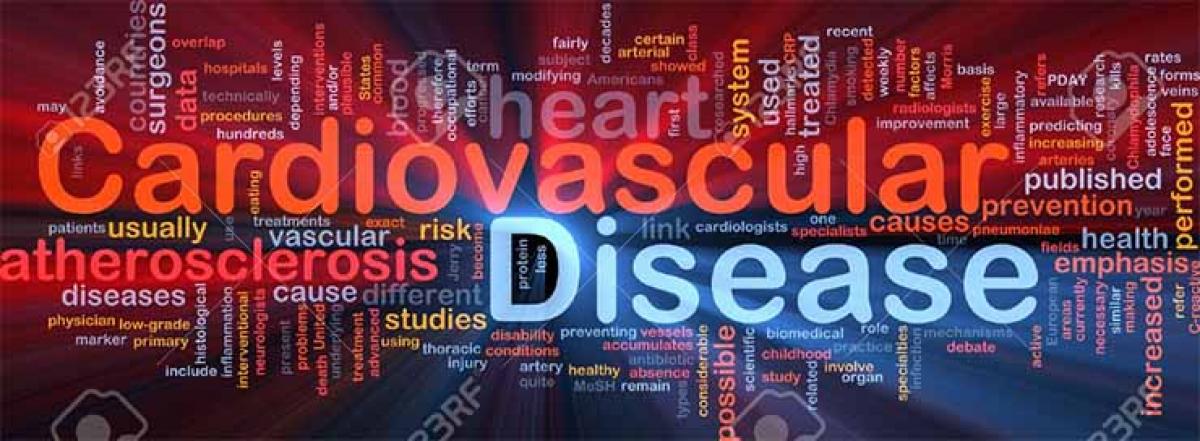Live
- Flirty Texts That Turn into Dates
- ‘Asli’ Sonakshi shares a glimpse of herself in ‘golden hour’
- Shraddha Kapoor took ‘thepla’ for her ‘foreign’ trip
- ChatGPT Now Supports Video Inputs: All Details
- B.Com vs BBA: Which degree better prepares you for an MBA?
- Apple Intelligence now features Image Playground, Genmoji
- National Energy Conservation Day: Fostering a sustainable future
- RG Kar issue: Day-long protests in Kolkata today on bail to Ghosh, Mondal
- Plans afoot to bring EPFO service at par with banking: LabourSecy
- vivo unveils X200 series of mobiles
Just In

One evening after dinner in 1991, Satish Karekar, then 42, a Mumbai businessman, experienced a dull pain and heaviness in the chest and lightness in the head. When the feeling persisted well into the night, his brother, who’s a doctor, whisked him off to hospital. “There, I was diagnosed as having suffered a heart attack, and promptly put on medication,” recalled Karekar.
- High fat intake/low fruit and vegetable intake? Yes
- Sedentary lifestyle? Yes
- Overweight? Yes
- Heavy smoker? Yes
- Alcohol consumer? Yes
- Stressed out? Yes
- Diabetic? No
New Delhi: One evening after dinner in 1991, Satish Karekar, then 42, a Mumbai businessman, experienced a dull pain and heaviness in the chest and lightness in the head. When the feeling persisted well into the night, his brother, who’s a doctor, whisked him off to hospital. “There, I was diagnosed as having suffered a heart attack, and promptly put on medication,” recalled Karekar.
.jpg)
Unlike Karekar, many heart attack victims don’t get a second chance. About 1.7 million Indian hearts stop beating every year, according to the World Health Organisation (WHO). Cardiovascular disease emerged as India’s top killer around the mid-1980s. Since the turn of the century, it is a growing threat. In 2012, one in four Indians who died, died of cardiovascular diseases, according to WHO data. It was one in five Indians in 2000.
Growing numbers of young people are being afflicted. About 12 percent of those experiencing heart attacks in India are below 40, double the number in the West. P.P. Ashok, head of neurology at Mumbai's Hinduja Hospital has observed a 15-20 percent increase in strokes in the 25 to 40 age group.
Why is India experiencing a cardiovascular disease epidemic? Heart disease doesn’t run in Karekar’s family. Both he and his other brother, who’s a businessman, have acquired heart conditions-“through faulty lifestyles,” he admitted.
The genetic disadvantages of being Indian Scientists studying the Indian propensity for cardiovascular disease have found causes at the cellular level-specifically in genes. Early insights into the association between bad tickers in Indians and bad genes came from the USA, when American-Indian cardiologist and head of the CADI (Coronary Artery Disease among Asian Indians) Research Foundation, Enas A Enas, was drawn to investigate the cause for an inconsistency he called the South Asian Paradox.
“Half of the Asian Indian community in the US is comprised of life-long vegetarians; this should have lowered the occurrence of cardiovascular diseases among them because consuming meat is a traditional risk factor. Also smoking, another traditional risk factor, is uncommon among Asian Indian women,” he said.
“Instead, we found Indians in the United States have three times the prevalence of heart disease, compared to the general US population.” Enas showed that Asian Indians are more likely to have high levels of lipoprotein (a), a variant of low-density lipoprotein (LDL) cholesterol, also called bad cholesterol, and a risk factor.
Research in India has seconded this finding. Indians are also genetically predisposed to develop Metabolic Syndrome, or Syndrome X, a metabolic condition associated with doubling the risk for cardiovascular diseases. Gene mutations are the leading reason for cardiomyopathy, a cardiovascular disease involving damage to the myocardium, the heart muscles, lessening the heart’s ability to pump blood.
Cardiomyopathy can trigger sudden cardiac death. Bad genes are bad news, but not as bad as you think.“Genetic predisposition to develop heart disease creates a loaded-gun scenario,” said cardiologist Ashok Seth, chairman of Fortis Escorts Heart Institute, New Delhi. You need fewer risk factors to trigger heart disease in the first instance and to suffer repeat cardiac episodes, he added.
By:Charu Bahri

© 2024 Hyderabad Media House Limited/The Hans India. All rights reserved. Powered by hocalwire.com







